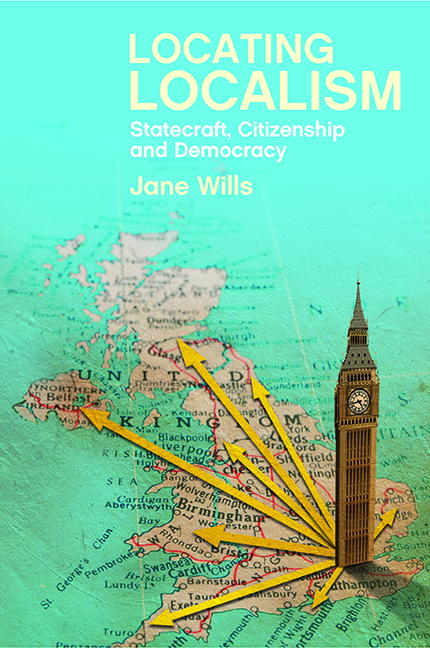Book contents
- Frontmatter
- Dedication
- Contents
- List of figures and tables
- Acknowledgements
- Introduction: the argument being made in this book
- one Making sense of localism
- two The geo-constitution and the long history of localism
- three The place of the people
- four Localist local government
- five Institution building for localist futures
- six Community organising: past, present and future
- seven A localist future?
- Appendix: Research design and methods
- References
- Index
one - Making sense of localism
Published online by Cambridge University Press: 05 April 2022
- Frontmatter
- Dedication
- Contents
- List of figures and tables
- Acknowledgements
- Introduction: the argument being made in this book
- one Making sense of localism
- two The geo-constitution and the long history of localism
- three The place of the people
- four Localist local government
- five Institution building for localist futures
- six Community organising: past, present and future
- seven A localist future?
- Appendix: Research design and methods
- References
- Index
Summary
Broadly speaking, localism comprises a shift in policy making and practice to decentralise political power towards local institutions and local people. Thus far, localism amounts to a series of experiments in statecraft and shifting expectations around citizenship. Some of these developments – in policy, local government, planning and community organising – provide the focus for much of the detail in later parts of this book. For now, however, this chapter aims to set the scene, setting localism in its wider geo-political context.
In many ways, localism is the next logical step in a process of political devolution that began during the Blair–Brown New Labour governments between 1997 and 2010. These Parliaments championed the successful devolution of political power to Scotland, Wales and Northern Ireland. During this period, Britain's national story became increasingly focused on an alliance of four different nations with divergent trajectories, and this has continued today. The creation of the Scottish Parliament has been particularly important in facilitating the development of a new cadre of national politicians, who used the new institution and its capabilities to pioneer new policies and practices with growing support from their people. Just 14 years after its creation, this Parliament was able to vote to pursue a referendum for full independence. The subsequent referendum campaign electrified the nation and the Scottish people proved their capacity to threaten the very unity of the British state. The referendum generated extraordinary levels of popular engagement and record turnout from voters, mobilising a new generation of political activists, fuelling the ranks of Scotland's political parties and generating a stronger sense of national identity, purpose and pride. The experience of active political engagement has then, in turn, shifted the culture and expectations of Scottish political life (Featherstone, 2015).
Scotland is a nation with an increasingly assertive political leadership and a strong sense of identity, but, in the wake of devolution, some parts of the British establishment and some political activists have started to explore the potential to further increase political decentralization within the United Kingdom (UK). Moreover, while the New Labour governments had granted limited devolution to Scotland and, to a lesser extent, Wales and Northern Ireland, they were never willing to consider the thorny issue of political representation for the largest and most dominant nation within the alliance.
- Type
- Chapter
- Information
- Locating LocalismStatecraft, Citizenship and Democracy, pp. 7 - 42Publisher: Bristol University PressPrint publication year: 2016

